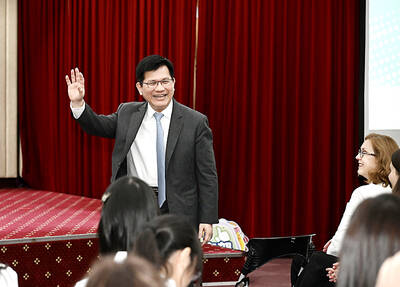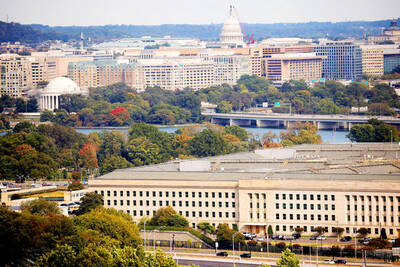Taiwan must tap into the global uncrewed aerial vehicle (UAV) market to obtain the capital necessary to develop a self-sufficient combat drone industry, experts said.
As defense analysts have speculated that China might invade Taiwan in 2027 or 2032, the nation must complete the decoupling of its drone supply chains from China in the next few years, Geosat Aerospace & Technology Inc (經緯航太科技) CEO Lo Cheng-fang (羅正方) said.
The ability to produce combat drones in wartime is crucial for Taiwan’s survival, but the nation’s UAV industry is still in its infancy, said Lo, who is also chairman of the Chiayi-based Asia UAV AI Innovation Application R&D Center.

Photo: CNA
The government should support the domestic industry to ensure Taiwan’s drone supply chains remain unbroken in the event of a military conflict with China, he said.
Drones are an integral part of President William Lai’s (賴清德) Five Trusted Industry Sectors, a category consisting of the semiconductor, artificial intelligence (AI), military, security and surveillance, and next-generation communications industries.
The administration aims to make Taiwan “the Asian hub of UAV supply chains for global democracies,” he said in his inaugural address on May 20.
These supply chains are made of about 40 Taiwanese firms that produce about a dozen drone models altogether, government data showed.
The Taiwanese drone sector was worth an estimated NT$2.86 billion (US$87.15 million) last year, while the global drone industry’s value is expected to reach US$80 billion by 2030.
Chiayi Economic Development Department Director Chiang Zhen-wei (江振瑋) said the global drone industry is split in two, with one side that uses Chinese supply chains and another that does not.
Because of those who have decoupled from China, there is a large opportunity for the domestic drone industry if it is prepared to seize it, he said.
The companies that are part of Chiayi’s drone center represent a complete UAV ecosystem, but the industry would still have to carve out an export market, Chiang said.
The operational costs of automated equipment capable of mass-producing reliable, quality components at scale cannot be funded by the domestic market alone, he added.
Despite Taiwan’s technical prowess, manufacturers cannot be expected to wade into the drone business just to supply domestic demand, said Lo Cheng-ying (駱正穎), a professor of mechanical engineering at National Formosa University.
“Becoming a part of the supply chain for democracies will be crucial going forward,” he said.
National Chung Cheng University strategic studies professor Lin Tai-ho (林泰和) said drones have significant battlefield applications and UAV manufacturing is an industry of ever-increasing importance strategically.
The Taiwanese UAV sector must develop an export market to supplement military contracts, especially as cheaper Chinese parts cannot be used, he said.
The Lai administration made the right call in pursuing the capability to manufacture drones independently of China’s supply chains, even if it is more expensive, Lin added.
Meanwhile, the government would play a key role in coordinating with its industrial partners, Hsuan Yuan Tech Co (璿元科技) CEO Chou Yu-tuan (周玉端) said.
The government must pay attention to industrial requirements in designing projects, as the current approach is leading to the proliferation of non-standard platforms with little commonality, which increases production difficulties and costs, he said.
The contract-issuing bodies of the government frequently demand changes to a project, such as its technical specifications and intended role, further adding to the chaos, he said.
Taiwan Swarm Innovation Inc (臺灣希望創新) CEO Li Chih-ching (李志清) said Washington is looking for allies to replace China in drone supply chains.
Taiwan has the technological capabilities to make drones, but Taiwanese systems are two to three times more expensive than their Chinese counterparts, he said.
Expanding into the global market would enable domestic UAV makers to benefit from the economy of scale and lower their prices to competitive levels, Li said.
However, the Taiwanese UAV sector is unlikely to be competitively priced compared with China, he said, adding the industry should concentrate on making drones for special applications for customers that cannot use systems that have Chinese parts.

FIREPOWER: On top of the torpedoes, the military would procure Kestrel II anti-tank weapons systems to replace aging license-produced M72 LAW launchers Taiwan is to receive US-made Mark 48 torpedoes and training simulators over the next three years, following delays that hampered the navy’s operational readiness, the Ministry of National Defense’s latest budget proposal showed. The navy next year would acquire four training simulator systems for the torpedoes and take receipt of 14 torpedoes in 2027 and 10 torpedoes in 2028, the ministry said in its budget for the next fiscal year. The torpedoes would almost certainly be utilized in the navy’s two upgraded Chien Lung-class submarines and the indigenously developed Hai Kun, should the attack sub successfully reach operational status. US President Donald Trump

Taiwan Semiconductor Manufacturing Co (TSMC, 台積電) is expected to start construction of its 1.4-nanometer chip manufacturing facilities at the Central Taiwan Science Park (CTSP, 中部科學園區) as early as October, the Chinese-language Liberty Times (the Taipei Times’ sister newspaper) reported yesterday, citing the park administration. TSMC acquired land for the second phase of the park’s expansion in Taichung in June. Large cement, construction and facility engineering companies in central Taiwan have reportedly been receiving bids for TSMC-related projects, the report said. Supply-chain firms estimated that the business opportunities for engineering, equipment and materials supply, and back-end packaging and testing could reach as high as

ALL QUIET: The Philippine foreign secretary told senators she would not respond to questions about whether Lin Chia-lung was in the country The Ministry of Foreign Affairs on Wednesday confirmed that a business delegation is visiting the Philippines, but declined to say whether Minister of Foreign Affairs Lin Chia-lung (林佳龍) is part of the group, as Philippine lawmakers raised questions over Lin’s reported visit. The group is being led by Deputy Minister of Agriculture Huang Chao-chin (黃昭欽), Chinese International Economic Cooperation Association (CIECA) chairman Joseph Lyu (呂桔誠) and US-Taiwan Business Council (USTBC) vice president Lotta Danielsson, the ministry said in a statement. However, sources speaking on condition of anonymity said that Lin is leading the delegation of 70 people. Filinvest New Clark City Innovation Park

DEFENSIVE EDGE: The liaison officer would work with Taiwan on drones and military applications for other civilian-developed technologies, a source said A Pentagon unit tasked with facilitating the US military’s adoption of new technology is soon to deploy officials to dozens of friendly nations, including Taiwan, the Financial Times reported yesterday. The US Department of Defense’s Defense Innovation Unit (DIU) is to send a representative to collaborate with Taiwan on drones and military applications from the semiconductor industry by the end of the year, the British daily reported, citing three sources familiar with the matter. “Drones will certainly be a focus, but they will also be looking at connecting to the broader civilian and dual-use ecosystem, including the tech sector,” one source was